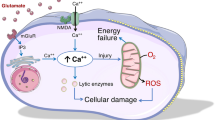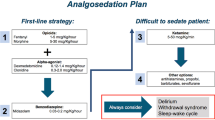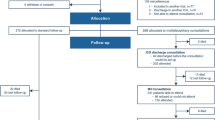Abstract
Postoperative cognitive dysfunction (POCD) remains a major issue that worsens the prognosis of elderly surgery patients. This article reviews the current research on the effect of different anesthesia methods and commonly utilized anesthetics on the incidence of POCD in elderly patients, aiming to provide an understanding of the underlying mechanisms contributing to this condition and facilitate the development of more reasonable anesthesia protocols, ultimately reducing the incidence of POCD in elderly surgery patients.
Similar content being viewed by others
References
Vatter H, Konczalla J, Seifert V, et al. Endothelin related pathophysiology in cerebral vasospasm: what happens to the cerebral vessels?. Acta Neurochir Suppl, 2011,110(Pt 1):177–180
Huang S, Hu H, Cai YH, et al. Effect of parecoxib in the treatment of postoperative cognitive dysfunction: A systematic review and meta-analysis. Medicine (Baltimore), 2019,98(1):e13812
Feinkohl I, Winterer G, Pischon T, et al. Hypertension and Risk of Post-Operative Cognitive Dysfunction (POCD): A Systematic Review and Meta-Analysis. Clin Pract Epidemiol Ment Health, 2017,13:27–42
Yang Y, Liu Y, Zhu J, et al. Neuroinflammation-mediated mitochondrial dysregulation involved in postoperative cognitive dysfunction. Free Radic Biol Med, 2022,178:134–146
Kotekar N, Shenkar A, Nagaraj R, et al. Postoperative cognitive dysfunction-current preventive strategies. Clin Interv Aging, 2018,13:2267–2273
Bhushan S, Li Y, Huang X, et al. Progress of research in postoperative cognitive dysfunction in cardiac surgery patients: A review article. Int J Surg, 2021,95:106163
Narasimhan B, Tandri H. Stellate Block in Refractory Ventricular Tachycardia: The Calm After the Storm. Circ Arrhythm Electrophysiol, 2019,12(9):e7707
Holmgaard F, Vedel AG, Rasmussen LS, et al. The association between postoperative cognitive dysfunction and cerebral oximetry during cardiac surgery: a secondary analysis of a randomised trial. Br J Anaesth, 2019,123(2):196–205
Kline R, Wong E, Haile M, et al. Peri-Operative Inflammatory Cytokines in Plasma of the Elderly Correlate in Prospective Study with Postoperative Changes in Cognitive Test Scores. Int J Anesthesiol Res, 2016,4(8):313–321
Liebert AD, Chow RT, Bicknell BT, et al. Neuroprotective EffectsAgainst POCD by Photobiomodulation: Evidence from Assembly/Disassembly of the Cytoskeleton. J Exp Neurosci, 2016,10:1–19
Jevtovic-Todorovic V, Absalom AR, Blomgren K, et al. Anaesthetic neurotoxicity and neuroplasticity: an expert group report and statement based on the BJA Salzburg Seminar. Br J Anaesth, 2013,111(2):143–151
Tzimas P, Andritsos E, Arnaoutoglou E, et al. Short-term postoperative cognitive function of elderly patients undergoing first versus repeated exposure to general anesthesia. Middle East J Anaesthesiol, 2016,23(5):535–542
Evered L, Silbert B, Knopman DS, et al. Recommendations for the Nomenclature of Cognitive Change Associated with Anaesthesia and Surgery-2018. Anesthesiology, 2018,129(5):872–879
Yang Y, Zhao X, Dong T, et al. Risk factors for postoperative delirium following hip fracture repair in elderly patients: a systematic review and meta-analysis. Aging Clin Exp Res, 2017,29(2):115–126
Williams-Russo P, Sharrock NE, Mattis S, et al. Cognitive effects after epidural vs general anesthesia in older adults. Arandomized trial. JAMA, 1995,274(1):44–50
Tzimas P, Samara E, Petrou A, et al. The influence of anesthetic techniques on postoperative cognitive function in elderly patients undergoing hip fracture surgery: General vs spinal anesthesia. Injury, 2018,49(12):2221–2226
Zhang X, Dong Q, Fang J, et al. Impacts of General and Spinal Anaesthesia on Short-Term Cognitive Function and Mental Status in Elderly Patients Undergoing Orthopaedic Surgery. J Coll Physicians Surg Pak, 2019,29(2):101–104
Rasmussen LS, Johnson T, Kuipers HM, et al. Does anaesthesia cause postoperative cognitive dysfunction? A randomised study of regional versus general anaesthesia in 438 elderly patients. Acta Anaesthesiol Scand, 2003,47(3):260–266
Krier C, Bohrer H, Polarz H, et al. Cognitive function of geriatric ophthalmology patients after local and general anesthesia. Ophthalmologe, 1993,90(4):367–371
Bhushan S, Huang X, Duan Y, et al. The impact of regional versus general anesthesia on postoperative neurocognitive outcomes in elderly patients undergoing hip fracture surgery: A systematic review and meta-analysis. Int J Surg, 2022,105:106854
Subramaniyan S, Terrando N. Neuroinflammation and Perioperative Neurocognitive Disorders. Anesth Analg, 2019,128(4):781–788
Umholtz M, Nader ND. Anesthetic Immunomodulation of the Neuroinflammation in Postoperative Cognitive Dysfunction. Immunol Invest, 2017,46(8):805–815
Orhun G, Sungur Z, Koltka K, et al. Comparison of epidural analgesia combined with general anesthesia and general anesthesia for postoperative cognitive dysfunction in elderly patients. Ulus Travma Acil Cerrahi Derg, 2020,26(1):30–36
Kristek G, Rados I, Kristek D, et al. Influence of postoperative analgesia on systemic inflammatory response and postoperative cognitive dysfunction after femoral fractures surgery: a randomized controlled trial. Reg Anesth Pain Med, 2019,44(1):59–68
Meng Z, Gao C, Li X, et al. Effects of Combined Epidural Anesthesia and General Anesthesia on Cognitive Function and Stress Responses of Elderly Patients Undergoing Liver Cancer Surgery. J Oncol, 2021,2021:8273722
Wang Y, Kong L, Liu X, et al. Effect of epidural block anesthesia combined with general anesthesia on postoperative cognitive ability of elderly patients undergoing thoracoscopic surgery. Int J Clin Exp Pathol, 2020,13(10):2447–2454
Zhang Y, Jiang L, Han Y, et al. Reduced Concentrations of NSE, S100beta, Abeta, and Proinflammatory Cytokines in Elderly Patients Receiving Ultrasound-Guided Combined Lumbar Plexus-Sciatic Nerve Block during Hip Replacement. Genet Res, 2022,2022:1384609
Shang Y, Qi F, Zheng Z, et al. Effect of bilateral paravertebral nerve block on cognitive function in elderly patients undergoing radical gastrectomy for gastric cancer: a prospective randomized double-blind controlled trial. BMC Anesthesiol, 2022,22(1):224
Perrier V, Julliac B, Lelias A, et al. Influence of the fascia iliaca compartment block on postoperative cognitive status in the elderly. Ann Fr Anesth Reanim, 2010,29(4):283–288
Zheng H, Li Y, Zhang W, et al. Electroacupuncture for patients with diarrhea-predominant irritable bowel syndrome or functional diarrhea: A randomized controlled trial. Medicine (Baltimore), 2016,95(24):e3884
Tian Q, Wang L, Yao L, et al. Effects of Zusanli electroacupuncture on somatostatin expression in the rat brainstem. J Mol Neurosci, 2013,49(1):28–37
Duan D, Yang X, Ya T, et al. Hippocampal gene expression in a rat model of depression after electroacupuncture at the Baihui and Yintang acupoints. Neural Regen Res, 2014,9(1):76–83
Leung AW, Lam LC, Kwan AK, et al. Electroacupuncture for older adults with mild cognitive impairment: study protocol for a randomized controlled trial. Trials, 2015,16:232
Kim JH, Cho MR, Park GC, et al. Effects of different acupuncture treatment methods on mild cognitive impairment: a study protocol for a randomized controlled trial. Trials, 2019,20(1):551
** L, Fang F, Yuan H, et al. Transcutaneous electrical acupoint stimulation for postoperative cognitive dysfunction in geriatric patients with gastrointestinal tumor: a randomized controlled trial. Trials, 2021,22(1):563
**e Z, Culley DJ, Dong Y, et al. The common inhalation anesthetic isoflurane induces caspase activation and increases amyloid beta-protein level in vivo. Ann Neurol, 2008,64(6):618–627
Pesic V, Milanovic D, Tanic N, et al. Potential mechanism of cell death in the develo** rat brain induced by propofol anesthesia. Int J Dev Neurosci, 2009,27(3):279–287
Zhang J, Tan H, Jiang W, et al. The choice of general anesthetics may not affect neuroinflammation and impairment of learning and memory after surgery in elderly rats. J Neuroimmune Pharmacol, 2015,10(1):179–189
Zhang Y, Shan GJ, Zhang YX, et al. Propofol compared with sevoflurane general anaesthesia is associated with decreased delayed neurocognitive recovery in older adults. Br J Anaesth, 2018,121(3):595–604
Geng YJ, Wu QH, Zhang RQ, et al. Effect of propofol, sevoflurane, and isoflurane on postoperative cognitive dysfunction following laparoscopic cholecystectomy in elderly patients: A randomized controlled trial. J Clin Anesth, 2017,38:165–171
Guo L, Lin F, Dai H, et al. Impact of Sevoflurane Versus Propofol Anesthesia on Post-Operative Cognitive Dysfunction in Elderly Cancer Patients: A Double-Blinded Randomized Controlled Trial. Med Sci Monit, 2020,26:e919293
Micha G, Tzimas P, Zalonis I, et al. Propofol vs Sevoflurane anaesthesia on postoperative cognitive dysfunction in the elderly. A randomized controlled trial. Acta Anaesthesiol Belg, 2016,67(3):129–137
Konishi Y, Evered LA, Scott DA, et al. Postoperative cognitive dysfunction after sevoflurane or propofol general anaesthesia in combination with spinal anaesthesia for hip arthroplasty. Anaesth Intensive Care, 2018,46(6):596–600
Pang QY, Duan LP, Jiang Y, et al. Effects of inhalation and propofol anaesthesia on postoperative cognitive dysfunction in elderly noncardiac surgical patients: A systematic review and meta-analysis. Medicine (Baltimore), 2021,100(43):e27668
Alalawi R, Yasmeen N. Postoperative Cognitive Dysfunction in the Elderly: A Review Comparing the Effects of Desflurane and Sevoflurane. J Perianesth Nurs, 2018,33(5):732–740
Rortgen D, Kloos J, Fries M, et al. Comparison of early cognitive function and recovery after desflurane or sevoflurane anaesthesia in the elderly: a double-blinded randomized controlled trial. Br J Anaesth, 2010,104(2):167–174
Weerink MAS, Struys MMRF, Hannivoort LN, et al. Clinical Pharmacokinetics and Pharmacodynamics of Dexmedetomidine. Clin Pharmacokinet, 2017,56(8):893–913
Deiner S, Luo X, Lin HM, et al. Intraoperative Infusion of Dexmedetomidine for Prevention of Postoperative Delirium and Cognitive Dysfunction in Elderly Patients Undergoing Major Elective Noncardiac Surgery: A Randomized Clinical Trial. JAMA Surg, 2017,152(8):e171505
Li WX, Luo RY, Chen C, et al. Effects of propofol, dexmedetomidine, and midazolam on postoperative cognitive dysfunction in elderly patients: a randomized controlled preliminary trial. Chin Med J (Engl), 2019,132(4):437–445
Mansouri N, Nasrollahi K, Shetabi H, et al. Prevention of Cognitive Dysfunction after Cataract Surgery with Intravenous Administration of Midazolam and Dexmedetomidine in Elderly Patients Undergoing Cataract Surgery. Adv Biomed Res, 2019,8:6
Zhou C, Zhu Y, Liu Z, et al. Effect of dexmedetomidine on postoperative cognitive dysfunction in elderly patients after general anaesthesia: A meta-analysis. J Int Med Res, 2016,44(6):1182–1190
**n X, Chen J, Hua W, et al. Intraoperative dexmedetomidine for prevention of postoperative delirium in elderly patients with mild cognitive impairment. Int J Geriatr Psychiatry, 2021,36(1):143–151
Lei D, Sha Y, Wen S, et al. Dexmedetomidine May Reduce IL-6 Level and the Risk of Postoperative Cognitive Dysfunction in Patients After Surgery: A Meta-Analysis. Dose Response, 2020,18(1):710616119
Wang W, Ma Y, Liu Y, et al. Effects of Dexmedetomidine Anesthesia on Early Postoperative Cognitive Dysfunction in Elderly Patients. ACS Chem Neurosci, 2022,13(15):2309–2314
Zhang Z, Li W, Jia H, et al. Postoperative Effects of Dexmedetomidine on Serum Inflammatory Factors and Cognitive Malfunctioning in Patients with General Anesthesia. J Healthc Eng, 2021,2021:7161901
Wang YL, Zhang Y, Cai DS, et al. Dexmedetomidine Ameliorates Postoperative Cognitive Dysfunction via the MicroRNA-381-Mediated EGR1/p53 Axis. Mol Neurobiol, 2021,58(10):5052–5066
** brain of rats by enhancing the PI3K/Akt signaling pathway. Neuropsychiatr Dis Treat, 2018,14:2191–2206
Lv J, Wei Y, Chen Y, et al. Dexmedetomidine attenuates propofol-induce neuro apoptosis partly via the activation of the PI3k/Akt/GSK3beta pathway in the hippocampus of neonatal rats. Environ Toxicol Pharmacol, 2017,52:121–128
Li YC, ** CH, An YF, et al. Perioperative inflammatory response and protein S-100beta concentrations -relationship with post-operative cognitive dysfunction in elderly patients. Acta Anaesthesiol Scand, 2012,56(5):595–600
Peng L, Xu L, Ouyang W, et al. Role of peripheral inflammatory markers in postoperative cognitive dysfunction (POCD): a meta-analysis. PLoS One, 2013,8(11):e79624
Skinner RA, Gibson RM, Rothwell NJ, et al. Transport of interleukin-1 across cerebro-microvascular endothelial cells. Br J Pharmacol, 2009,156(7):1115–1123
Rivest S, Lacroix S, Vallieres L, et al. How the blood talks to the brain parenchyma and the paraventricular nucleus of the hypothalamus during systemic inflammatory and infectious stimuli. Proc Soc Exp Biol Med, 2000,223(1):22–38
Zhu YZ, Yao R, Zhang Z, et al. Parecoxib prevents early postoperative cognitive dysfunction in elderly patients undergoing total knee arthroplasty: A doubleblind, randomized clinical consort study. Medicine (Baltimore), 2016,95(28):e4082
Tian Y, Zhao P, Li L, et al. Pre-emptive parecoxib and post-operative cognitive function in elderly patients. Int Psychogeriatr, 2014,27(2):1–8
Huang S, Hu H, Cai YH, et al. Effect of parecoxib in the treatment of postoperative cognitive dysfunction: A systematic review and meta-analysis. Medicine (Baltimore), 2019,98(1):e13812
Hongyu X, Qingting W, **aoling S, et al. Penehyclidine hydrochloride on postoperatively cognitive function. Med Hypotheses, 2019,129:109246
Chi YL, Li ZS, Lin CS, et al. Evaluation of the postoperative cognitive dysfunction in elderly patients with general anesthesia. Eur Rev Med Pharmacol Sci, 2017,21(6):1346–1354
Borovikova LV, Ivanova S, Zhang M, et al. Vagus nerve stimulation attenuates the systemic inflammatory response to endotoxin. Nature, 2000,405(6785):458–462
Kalb A, von Haefen C, Sifringe M, et al. Acetylcholinesterase inhibitors reduce neuroinflammation and -degeneration in the cortex and hippocampus of a surgery stress rat model. PLoS One, 2013,8(5):e62679
Zhu B, Sun D, Yang L, et al. The effects of neostigmine on postoperative cognitive function and inflammatory factors in elderly patients-a randomized trial. BMC Geriatr, 2020,20(1):387
Fodale V, Santamaria LB, Schifilliti D, et al. Anaesthetics and postoperative cognitive dysfunction: a pathological mechanism mimicking Alzheimer’s disease. Anaesthesia, 2010,65(4):388–395
Evans DE, Kobrine AI, LeGrys DC, et al. Protective effect of lidocaine in acute cerebral ischemia induced by air embolism. J Neurosurg, 1984,60(2):257–263
Mitchell SJ, Pellett O, Gorman DF, et al. Cerebral protection by lidocaine during cardiac operations. Ann Thorac Surg, 1999,67(4):1117–1124
Caracas HC, Maciel JV, Martins PM, et al. The use of lidocaine as an anti-inflammatory substance: a systematic review. J Dent, 2009,37(2):93–97
Chen K, Wei P, Zheng Q, et al. Neuroprotective effects of intravenous lidocaine on early postoperative cognitive dysfunction in elderly patients following spine surgery. Med Sci Monit, 2015,21:1402–1407
Hashemi SJ, Heidari SM, Rahavi A, et al. Lidocaine administration before tracheal extubation cannot reduce post-operative cognition disorders in elderly patients. Adv Biomed Res, 2013,2:81
Li YN, Zhang Q, Yin CP, et al. Effects of nimodipine on postoperative delirium in elderly under general anesthesia: A prospective, randomized, controlled clinical trial. Medicine (Baltimore), 2017,96(19):e6849
Sun D, Yang L, Wu Y, et al. Effect of intravenous infusion of dobutamine hydrochloride on the development of early postoperative cognitive dysfunction in elderly patients via inhibiting the release of tumor necrosis factor-alpha. Eur J Pharmacol, 2014,741:150–155
Sun S, Sun D, Yang L, et al. Dose-dependent effects of intravenous methoxamine infusion during hip-joint replacement surgery on postoperative cognitive dysfunction and blood TNF-alpha level in elderly patients: a randomized controlled trial. BMC Anesthesiol, 2017,17(1):75
Author information
Authors and Affiliations
Corresponding authors
Ethics declarations
The authors declare that there is no conflict of interest with any financial organization or corporation or individual that can inappropriately influence this work.
Rights and permissions
About this article
Cite this article
Zhu, Hy., Yan, Jl., Zhang, M. et al. Anesthesia, Anesthetics, and Postoperative Cognitive Dysfunction in Elderly Patients. CURR MED SCI 44, 291–297 (2024). https://doi.org/10.1007/s11596-024-2836-8
Received:
Accepted:
Published:
Issue Date:
DOI: https://doi.org/10.1007/s11596-024-2836-8




